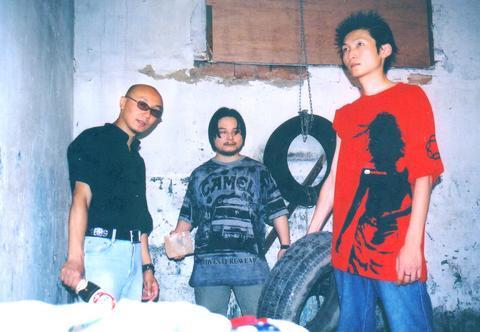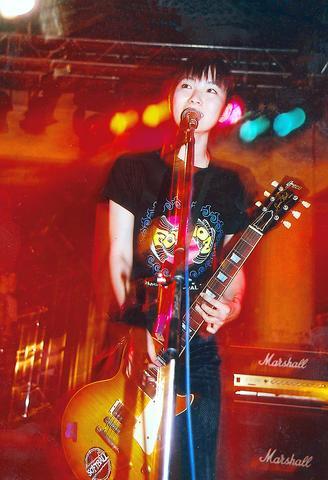Freddy Lin, head of the Taiwan Rock Alliance (TRA), is fond of saying that one doesn't need to be anti-China to be pro-Taiwan. But venting some spleen against China once a year at the Say Yes to Taiwan festival isn't entirely out of bounds either. And if a band actually from China is on hand, as Guangzhou-based punk trio Pangu (
Falling on the historically significant date of Feb. 28, the festival commemorates the 228 Incident of 1947. That incident has taken on powerful meaning, especially since the rise of the DPP, as an enormous wedge between the ethno-cultural entities described by the terms Mainlanders (外省人) and Taiwanese (本省人).
So, when China is evoked in raucous, expletive-filled choruses at the concert, the word refers to those jerks across the Strait pointing all those missiles our way as much as it does to the Chinese cultural nationalist ideology of no small number of KMT supporters.

PHOTO COURTESY OF TRA
"The KMT was the murderer behind the 228 Incident. They don't want Taiwanese people to remember that. They keep saying, `oh, we should forget the past and move on.' But the murderers have to admit to what they did and apologize before we can do that," Freddy said.
Over the past three years, Say Yes to Taiwan has been held in 228 Memorial Peace Park. This year, though, the venue for the show has been moved to the plaza in front of the Presidential Palace.
"We got that venue because the DPP supports our stance on the issue of 228, not because we [the TRA] support their stance on anything," Freddy said.

PHOTO COURTESY OF TRA
With such strong political undertones it's almost easy to forget about the powerful line-up of 14 bands that will be playing.
This year, groups will be converging on Taipei from Hong Kong, Japan, South Korea, the US, and all over Taiwan.
Headlining the show will be Akiakane, the new incarnation of Tokyo's cutesy girl punk band Softball. Softball played Say Yes to Taiwan for the past three years and last week Akiakane organized their own Say Yes to Taiwan festival in Tokyo, inviting Taipei indie rock band Nipples and Freddy Lin's band Chthonic (
In a break from years past, when the line-up was heavily tilted toward rock, this year includes Dog G (
But rock has been and remains the main draw of the show, with South Korea's hugely popular nu-metal band Nevada 51 and Liquid Gardens from the US, Akiakane and Pangu rounding out the foreign rock acts this year, with local bad boys LTK and a handful of other heavy-riffing bands representing the hometown.
Even if you don't care much for punk music, seeing Pangu play in front of the Presidential Office should be reason enough to come out for the show.

Taiwan has next to no political engagement in Myanmar, either with the ruling military junta nor the dozens of armed groups who’ve in the last five years taken over around two-thirds of the nation’s territory in a sprawling, patchwork civil war. But early last month, the leader of one relatively minor Burmese revolutionary faction, General Nerdah Bomya, who is also an alleged war criminal, made a low key visit to Taipei, where he met with a member of President William Lai’s (賴清德) staff, a retired Taiwanese military official and several academics. “I feel like Taiwan is a good example of

March 2 to March 8 Gunfire rang out along the shore of the frontline island of Lieyu (烈嶼) on a foggy afternoon on March 7, 1987. By the time it was over, about 20 unarmed Vietnamese refugees — men, women, elderly and children — were dead. They were hastily buried, followed by decades of silence. Months later, opposition politicians and journalists tried to uncover what had happened, but conflicting accounts only deepened the confusion. One version suggested that government troops had mistakenly killed their own operatives attempting to return home from Vietnam. The military maintained that the

Jacques Poissant’s suffering stopped the day he asked his daughter if it would be “cowardly to ask to be helped to die.” The retired Canadian insurance adviser was 93, and “was wasting away” after a long battle with prostate cancer. “He no longer had any zest for life,” Josee Poissant said. Last year her mother made the same choice at 96 when she realized she would not be getting out of hospital. She died surrounded by her children and their partners listening to the music she loved. “She was at peace. She sang until she went to sleep.” Josee Poissant remembers it as a beautiful

Before the last section of the round-the-island railway was electrified, one old blue train still chugged back and forth between Pingtung County’s Fangliao (枋寮) and Taitung (台東) stations once a day. It was so slow, was so hot (it had no air conditioning) and covered such a short distance, that the low fare still failed to attract many riders. This relic of the past was finally retired when the South Link Line was fully electrified on Dec. 23, 2020. A wave of nostalgia surrounded the termination of the Ordinary Train service, as these train carriages had been in use for decades